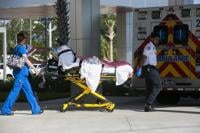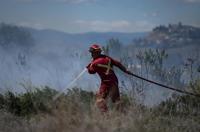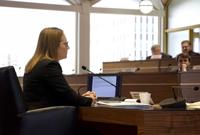Hospitals and other health care facilities on Florida’s Gulf Coast — still reeling from Hurricane Helene — are now revving up for Hurricane Milton.
The system, which is shaping up to be one of the most powerful to hit the region in years, is projected to make landfall a bit south of the Tampa area late Wednesday. Long-term care facilities in counties where mandatory evacuations have been issued are taking their patients elsewhere, while hospitals are largely on guard, preparing to stay open through the storm.
According to Florida Gov. Ron DeSantis’ , 10 hospitals have reported evacuations as of Tuesday afternoon. Three hundred health care facilities have evacuated as of this morning, the most many of the staff working there could remember, said Florida Agency for Health Care Administration deputy secretary Kim Smoak. That count included 63 nursing homes and 169 assisted living facilities.
Steve McCoy, chief of the Florida Department of Health’s Bureau of Emergency Medical Oversight, said it is the state’s “largest evacuation ever.”
Health officials are using almost 600 vehicles to take patients out of the storm’s path, tracking them with blue wristbands that show where they were evacuated from and where they are being sent. They plan to keep getting patients out through the night, until winds reach sustained speeds of 40 mph and driving conditions become unsafe.
“I’ve lived on the Gulf Coast my entire life and in Sarasota for 20 years. I’ve never seen anything like this,” said David Verinder, CEO of Sarasota Memorial Health Care System. “Our anxieties are high, but we’re as prepared as we know how to be.”
Hospitals brace for hurricane
Tampa General Hospital has stocked up on more than five days of supplies, including food, linens and 5,000 gallons of water, in addition to an on-site well. In the event of a power disruption, the hospital also has an energy plant with generators and boilers located 33 feet above sea level.
Tampa General deployed an “aquafence” to successfully prevent storm-surge flooding during . The barrier will be up again when Milton makes landfall and can withstand a storm surge of 15 feet. The U.S. ��ɫtv Hurricane Center estimates Milton’s surges will be 10 to 15 feet high at their peak.
No one will be working on the first floor of Tampa General Hospital for the foreseeable future — just in case.
“While AquaFence has proven effective in the past, it is just the first line of defense and one of many mitigation efforts we’ve implemented this week to safely continue care for our patients,” said Jennifer Crabtree, chief of staff at Tampa General.
The Tampa health system has shuttered many urgent care and imaging locations, but its four hospital campuses are prepared to remain open through the storm.
HCA Florida Healthcare, one of the state’s largest health care networks, has evacuated patients from five hospitals to sister facilities. The closed HCA Florida hospitals are Pasadena Hospital in St. Petersburg, Largo West Hospital in Largo, Florida Englewood Hospital in Englewood, West Tampa Hospital in Tampa and Fawcett Hospital in Port Charlotte, where strong winds and flooding during Hurricane Ian.
AdventHealth North Pinellas evacuated its 40 patients Tuesday afternoon, transferring them to nearby hospitals in their health system. The hospital’s emergency department remains open. Randy Haffner, CEO and president of AdventHealth Florida, said in an emailed statement that the system is “as prepared as we can be with water, generators, sandbags, satellite phones and the best caregivers there are.”
Hospitals are shuttering nearby, but Sarasota Memorial Health Care System also plans to stay open through the storm and shelter in place, Verinder said. Still, “we are concerned about the many unknowns,” he said.
Verinder estimates the system, stocked with enough food, water, linens and medications for at least seven days and 200,000 gallons of fuel, will be expected to shelter and support more than 4,000 people during the hurricane, though they are already close to capacity.
More than 2,500 staff members are gearing up for multiple nights in the hospital starting Tuesday, so Sarasota Memorial is providing childcare and pet shelters at both of its campuses.
“We are not a designated medical shelter, but we are working with the county to care for medically dependent persons assigned to the hospital because of the acuity of their needs … and patients evacuated from other hospitals in the region,” he said.
Dr. Matt Shannon, director of community emergency medicine at University of Florida Health, said the state’s flagship is prepared to take patients.
“The emergency department… we never close,” he said. "We have five emergency departments, all of which are open and functioning. This is not our first rodeo — we’ve been through this many times before.”
Repeated rough hurricane seasons have hardened Florida facilities and prepared them for Milton, said Mary Mayhew, president and CEO of the Florida Hospital Association. Still, the sheer power of Hurricane Milton and the back-to-back nature of storms will affect “a wide swath of the state and the hospitals.”
“It’s increasing the vulnerabilities in the area, from flooding to clogged drains to debris that hasn’t been removed that may exacerbate the situation that is already forecasted to be catastrophic,” Mayhew said. “Area hospitals routinely prepare for the worst and hope for the best.”
Long-term care facilities evacuate
In a briefing Tuesday, state officials and long-term care industry representatives urged nursing homes and assisted living facilities to prepare for long power outages, damage to sewer systems and being unable to access electronic health records.
“We want to remind you that all emergencies are local,” said Emmett Reed, CEO of the Florida Health Care Association, which represents nursing homes and assisted living providers in the state. “You need to start with your local emergency office to report any questions you might have.”
Florida’s west coast, which includes Pinellas, Manatee and Hillsborough counties, has the highest concentration of nursing centers in the state, Florida Health Care Association spokesperson Kristen Knapp said.
“Based on what has been reported, at a minimum you’re talking about 5,000-6,000 nursing home residents that have evacuated,” Knapp said in an email.
In counties under state of emergency orders, nursing homes and assisted living facilities are required to have enough emergency generator fuel to power life-saving equipment and keep indoor temperatures at a safe level for 96 hours.
Deborah Franklin, a member of the Florida Health Care Association’s emergency response team, said centers should be printing resident documents, including medications, dietary restrictions and more, even if they are not in the worst of the hurricane’s path. She also urged staff to consider the mental health of their residents, some of whom are moving for the second time in just a few weeks.
“You must address — after the storm or even during the storm — trauma-informed care for these residents,” Franklin said. “They could be worried about their families. They could be worried about if they’re going to have a home to go back to.”
Sixty-seven year old Lillie Whiting said she doesn’t plan on evacuating the assisted living facility where she lives a few blocks from the bay in Clearwater. But she may have to pack up anyway, if staff at Magnolia Manor determine that residents need to be relocated to another facility across town.
“We might have to evacuate, but they doubt it, saying we’ll see what goes on,” Whiting said. “If we do, they got another place we can go.”
The retired housekeeper took advantage of the clear weather Tuesday afternoon to get some fresh air, supported by the walker she uses to get around. She is getting more nervous as Hurricane Milton barrels towards the Gulf Coast, but she said she feels confident the facility will take care of her and the other residents.
“Kinda scared,” she said. “But I be praying all the time.”
Concerns raised about at-home care
Shannon from UF Health said most people with lung issues who rely on oxygen at home have backup oxygen bottles prepared, and some new devices even have backup batteries.
But he is concerned about elderly people and those who live in rural areas.
“We see them in the emergency room when backups fail or they don’t have access to a generator,” Shannon said.
Dialysis facilities across the state are trying to provide even shortened treatments to as many patients as possible before closing for the storm.
“Helene, they were able to get back up and running pretty quickly. But with the wind, this could be a different kind of event,” said Helen Rose of Health Services Advisory Group, which is helping coordinate disaster response for kidney patients. The network has established a phone helpline and will keep an updated list of open facilities during and after the storm.
___
Associated Press Florida statehouse reporter Kate Payne in Tampa contributed to this report.
___
The Associated Press Health and Science Department receives support from the Robert Wood Johnson Foundation. The AP is solely responsible for all content.










































